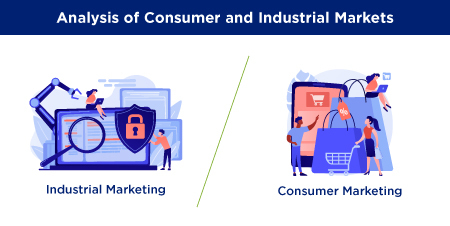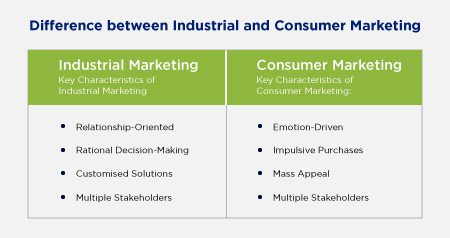Are you the owner of an industrial company looking for industrial marketing-related services for your B2B business? Do you want to know how industrial marketing differs from consumer marketing? If yes, then this article is for you! Marketing is a dynamic field that adapts and evolves to cater to the unique needs and preferences of different target audiences. Two primary branches of marketing that stand out are industrial marketing and consumer marketing.
While both share similar goals of promoting products and services, they cater to different markets and require distinct strategies to succeed. In this blog, we will delve into the differences and comparisons between industrial vs consumer marketing, shedding light on their respective approaches and critical considerations.
Difference Between Consumer Market And Industrial Market:
As an industrial owner, you cannot refute the importance of industrial marketing strategies in scaling the sales of your highly specialised products or services. However, you might have always wondered how industrial marketing is different from consumer marketing. Well, the difference between these two marketing strategies can be understood by recognising the distinction in their target markets, i.e. consumer and industrial markets.
Analysis of Consumer and Industrial Markets


-
Consumer Market
It’s a market that involves the sale of goods/services to the end-users. So, if you are selling, say, books, groceries, bags, or shoes, that are purchased by customers who are going to use or consume them finally, then you are in the consumer market.
-
Industrial Market
It is a factor market that involves the sale of unfinished or semi-finished goods that buyers use as raw materials in their production process. For example – when a manufacturer of large toy-making machinery sells it to another business that uses this machinery to produce and sell toys in the market, these businesses are in the industrial market..
Difference between Industrial and Consumer Marketing


-
Industrial Marketing
Industrial marketing or B2B marketing refers to marketing industrial goods/services in the industrial market. Industrial marketing management relies on the tools of competitive tendering and effective communication channels between industrial companies and professional buyers of their highly specialised products. It involves a protracted sale-purchase process to provide innovative solutions to industrial customers’ problems.
-
Characteristics of Industrial Marketing
- Relationship-Oriented: Industrial marketing relies heavily on building enduring relationships between companies. The emphasis is on trust, reliability, and effective communication.
- Rational Decision-Making: B2B transactions often involve complex purchasing decisions, emphasising cost-effectiveness, efficiency, and long-term benefits.
- Customised Solutions: Industrial advertising often requires tailored products or services to address specific business needs, resulting in long-term partnerships.
- Multiple Stakeholders: Purchasing decisions in industrial marketing involve several stakeholders within the buying organisation, necessitating targeted communication.
-
Consumer Marketing
Consumer or B2C marketing refers to marketing finished products/services to the potential end-customers in a consumer market. It relies on gaining extensive knowledge about the tastes and preferences of the end customers. It focuses on generating demand through marketing tools such as advertising campaigns, attractive packaging, after-sales services, etc.
-
Characteristics of Consumer Marketing:
- Emotion-Driven: Consumer marketing leverages emotions, aspirations, and psychological triggers to connect the product or service with the individual consumer.
- Impulsive Purchases: B2C transactions often involve more spontaneous buying decisions driven by advertising, branding, and perceived benefits.
- Mass Appeal: Consumer marketing targets a broader audience, focusing on reaching as many potential buyers as possible through various channels.
- Brand Loyalty: Building brand loyalty and a strong customer base is crucial in consumer marketing to ensure repeat business and positive word-of-mouth.
Comparative Analysis: Industrial Marketing vs Consumer Marketing
| Criteria | Industrial Marketing | Consumer Marketing |
|---|---|---|
| Type of Products | Products are complex and highly specialized that require expert knowledge. | Products are simple and easy-to-use that can be straightforwardly mass-marketed. |
| Target Audience | Professional and trained business owners who use the product of your industrial company as a factor of production, i.e. as an input in their production process. | End-users who purchase the product or avail the services for final consumption and gratification. |
| Motives of Sellers | To influence institutional buyers throughout their complete industrial buying process. | To create awareness of the availability of a product or service by a particular brand and generate demand by highlighting the salient features |
| Strategic Focus | Developing and nurturing partnerships that focus on building long-term relations with business partners by gaining their trust. | Dynamic advertising that induces the impulsive buying behavior of the customers and makes them loyal to the brand. Customers may or may not be the long-term users of the products/services. |
| Marketing Strategies | Digital Content marketing (posting blogs, white papers, case studies on informational websites), personalized presentations to clients, distributing product samples, etc. | Various online and offline advertising and marketing tools including print, television, and several online or social media platforms. |
| Marketing Elements | Encompasses all the operational competencies and processes employed by the company in delivering value to their customers. | Encompasses only highlighting the benefits/utilities that customers will derive by using the product/service. |
| Market Reach | Narrow and constricted as industrial marketers deal with the limited magnitude of businesses requiring products/services of their clients. | Wide and extensive as consumer marketers market the products/services to potential mass customers. |
Industrial Marketing Company
Businesses hire the services of an industrial marketing company or agency to distribute their products to other companies using different industrial marketing channels. The company formulates comprehensive industrial marketing and brand strategies for its clients and designs lead nurturing campaigns for them.
Other expert services include – market analytics, SEO, digital marketing, web development, and many more, depending on your business requirements. Thus, employ a leading industrial marketing company or partner with an industrial marketing agency to get qualified leads for your sales and enhance your competitiveness in the B2B market.
Interesting: The Complete Guide to Industrial Market Segmentation
Wrapping Up
Industrial marketing takes secondary precedence in the goals of most industrial companies. It is an entirely different game altogether in a B2B environment compared to its counterpart, i.e. the B2C environment, where it takes the form of consumer marketing. Both marketing strategies aim to gain substantial market share by converting sales leads into successful customers.
However, both mechanisms have a vast disparity in the marketing approach. Amura offers competent industrial marketing solutions to effectively communicate the distinctive expertise of your company to your target audience. Over the years, we have helped both B2B and B2C brands with curated marketing efforts to deliver quantifiable results. As one of India’s fastest-rising growth marketing agencies, we understand the distinction between consumer advertising vs industrial advertising to deliver standout services and help your brand achieve its marketing objectives.
For years, our growth marketing experiments have helped multiple B2B brands: Mark Compressor, Ingersoll Rand, Castrol, Hyundai Construction Equipment, Cummins and many more and B2C brands: Tork Motors, iVOOMi Energy, Beyerdynamic, Symphony, and many more in achieving their marketing goals.

